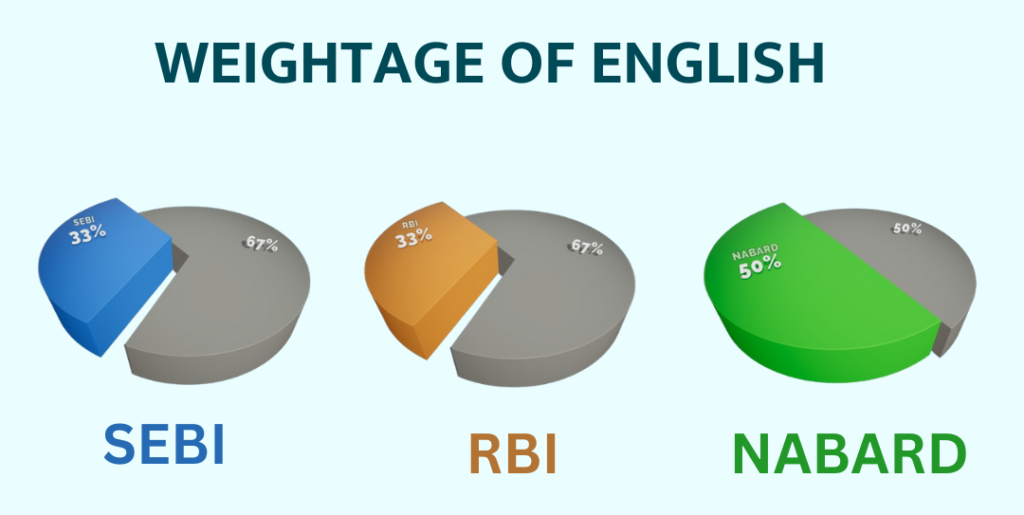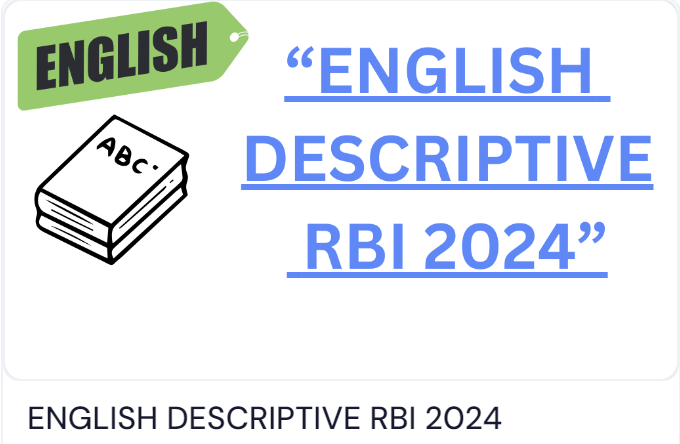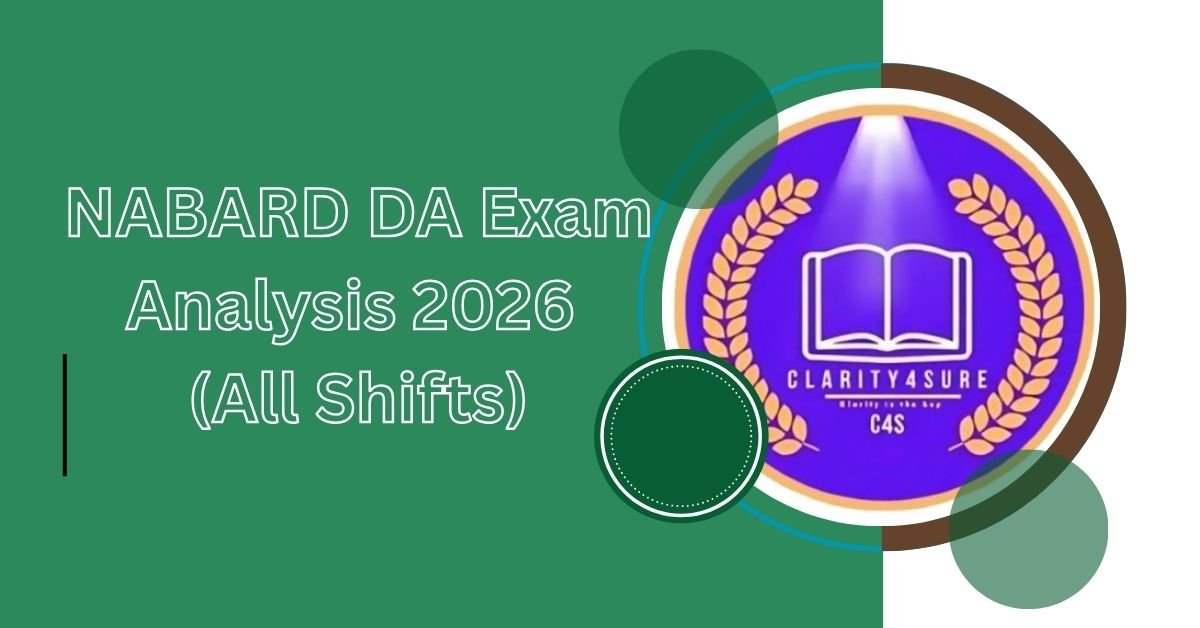If you’re reading this blog, chances are you have successfully cleared the phase 1 exams of RBI/SEBI/NABARD, or you’re a dedicated candidate diligently preparing for the crucial phase 2 before phase 1.

In these regulatory body exams, the English Descriptive section constitutes a significant portion—approximately 33% to 50% of the phase 2 evaluation. Neglecting this section could undermine all your hard work and dedication from phase 1, where you’ve already outperformed 98% of other aspirants.

Achieving good marks in English is equally, if not more, important than subjects like ESI, ARD, and Finance. Many candidates, especially those for whom English is not their first language, face the challenge of writing nearly 1200 words in 90 minutes for 100 marks, which accounts for half of the phase 2 total, and that too you have to write in Notepad like Portal which we are rarely accustomed to.
Statistics indicate that 96.71% of Indians primarily communicate and process information in their mother tongue. Therefore, preparing strategically and separately for English is crucial if your goal is to secure a managerial position at these esteemed regulatory bodies.

Introduction to the English Descriptive Section

The English Descriptive section aims to assess candidates’ written communication and drafting skills. It plays a vital role in the overall exam pattern, and scoring well in this section can significantly boost the overall score, making it essential for candidates to prepare thoroughly.
Purpose of the English Descriptive Section
The primary purpose of the English Descriptive section is multi-faceted. It aims to evaluate:
- Communication Skills: The ability to express ideas clearly and effectively, is an essential skill for any professional.
- Analytical and Critical Thinking: The capacity to analyze topics critically and present arguments logically, reflecting a candidate’s depth of understanding.
- Idea Presentation: How well candidates can organize their thoughts and present them coherently, is crucial for clear and effective communication.
Key Components of the English Descriptive Section
The English Descriptive section comprises various components designed to test different aspects of writing and comprehension:
- Essay Writing: This tests the structure, coherence, and content of the candidate’s writing. Essays typically range from 200 to 600 words, requiring candidates to present their ideas in a clear and organized manner.
- Precis Writing: This assesses summarization skills and conciseness. Candidates need to condense a given passage into a shorter version without losing the essence of the original text.
- Reading Comprehension: This component evaluates the interpretation and understanding of texts. Candidates answer questions based on a given passage, testing their ability to extract and articulate key information.
- Letter and Report Writing (NABARD): This tests formal and professional communication skills, essential for drafting clear and concise official documents.
Skills Assessed in the English Descriptive Section
The English Descriptive section assesses several key skills that are crucial for professional success:
- Clarity and Precision: The ability to express ideas clearly and precisely.
- Logical Flow: Organizing thoughts logically to ensure the writing is coherent and easy to follow.
- Grammatical Accuracy: Correct use of grammar and vocabulary to enhance the readability and professionalism of the writing.
- Critical Analysis: The ability to analyze topics and present well-founded arguments, reflecting a deep understanding of the subject matter.
Common Topics for Essay Writing
The essay topics in these exams cover a wide range of subjects but mainly fall under these broad categories, reflecting the extensive knowledge base expected of candidates:
- Current Affairs and Social Issues: Topics such as mental health, teamwork, and financial literacy.
- Economic and Financial Topics: Subjects like the role of technology in financial fraud prevention and mergers and acquisitions.
- Environmental Concerns: Issues such as climate change and renewable energy.
- Technological Advancements: Topics including techno-stress and digital currency.
- Ethical and Philosophical Issues: Subjects such as peace and understanding.
(These topics are based on the last 2 years questions asked in all 3 exams.)
Exam Pattern and Structure Analysis of SEBI, RBI and NABARD
SEBI
- Marks: 100
- Time: 60 minutes
- Weightage: One-third of the total exam score
- Questions:
- Essay (200 words, 30 marks)
- Precis (150-170 words, 30 marks)
- Passage Questions (5 questions, 8 marks each)
RBI
- Marks: 100
- Time: 90 minutes
- Questions:
- Essay (600 words, 40 marks)Precis (180-200 words, 30 marks)
- Passage Questions (5 questions, 8 marks each)

NABARD
- Marks: 100
- Time: 90 minutes
- Questions:
- Essay (500 words, 40 marks)
- Precis (150 words, 30 marks)
- Letter (150 words, 30 marks)

Comparison of English descriptive pattern of NABARD grade A exam, RBI Grade B Exam and SEBI Grade A Exam
| NABARD | RBI | SEBI | |
| Type of Q asked in last 3 years in English Descriptive of NABARD Grade A, RBI Grade B and SEBI Grade A | Essay – 40 Marks Letter – 30 Marks Precis – 30 Marks | Essay – 40 Marks Precis – 30 Marks Reading Comprehension (RC) – 30 Marks | |
| Marks | 100 | 100 | 100 Marks |
| Time | 90 Minutes | 90 Minutes | 60 Minutes |
| Weightage | Consolidated Marks | Consolidated Marks | 1/3rd |
Previous year question of NABARD Grade A Exam (PYQ)
| PYQ 2021, 2022,2023 English Descriptive Phase II (Mains) NABARD Grade A Exam | |||
| Year | Essay 40 Marks | Letter 30 Marks | Precis 30 Marks |
| 2021 | Dropout in school: Causes and Prevention. Benefits of the social media platform for farmers.Contribution of the Tourism Sector in the Indian Economy. Workplace Diversity: Measures for promoting diversity at the workplace | Write a letter to the editor of the newspaper telling the importance of developing sports infrastructure in India to create more Olympians.Write a letter to the credit card company requesting to change your address associated with a credit card.Write a letter to the block officer informing him about the pitiful condition of your village dispensary. | Passage on health was given |
| 400 Words | 150-200 Words | 150 Words | |
| 2022 | 1. Climate Change & Impact on Agriculture 2. Youth are leaving the agriculture sector after attaining Higher Education 3. Agriculture logistics in Indian Economy 4. Manufacturing Sector in India and its importance | Damaged Furniture Replacement letter manager of retailerCongratulations letter to the Manager – Senior Manager promotion. Letter for the (RWA) society president- Residential – disaster preparation review | Topic for the Passage was based on – “Battery making & Pollution- EV Criticize- Long term life- EV is future“. |
| Words | 300 Words | 150 Words | 120 Words |
| 2023 | 1. Discuss the role of technology in Agriculture 2. Cooperatives and Their Role In Rural Development of India 3. Work Life Balance & its importance 4. Detrimental Effects Of Social Media On Relationships & Health | 1. Write a letter to the customer care department of the electricity board for changing the address. 2. Write a letter to your residential society secretary to open a small library for children in the society. 3. Write a letter to congratulate your manager on his farewell and appreciate the role played by him in your career. | Passage on Social Media & Short Videos for Brand Promotion |
| Word Limit | 500 Words | 250-300 Words | 150 Words |
What is Word Limit in NABARD Grade A exam English descriptive Essay and Letter?
The word limit in NABARD Grade A exam Essay varies from year to year and student should be ready to embrace both 600 words and 300 words in exam. In year 2021 they asked just 300 words Essay but in 2023 the word limit asked was of 500 words. Soo it is advised to practice on higher side so that you do not panic in the exam hall for higher word limit in NABARD exam and is able to complete it in stipulated time.
Importance and Weightage of English Descriptive Section

The English Descriptive section constitutes a significant portion of the total exam score and will ultimately decide whether you receive an interview call or not. The weightage of English Descriptive in Phase 2 of RBI GRADE B/SEBI GRADE A & NABARD GRADE A Exams is as follows:
- SEBI: 100 Marks weightage given is 1/3rd
- RBI: 33.33% ESI -100 Marks + Finance & Management – 100 Marks + English 100 Marks
- NABARD: 50% ESI+ ARD – 100 Marks English – 100 Marks
Given this substantial weightage, excelling in the English Descriptive section is crucial for clearing these exams. Candidates must prepare thoroughly to ensure they can effectively tackle each component.
Preparation Tips for the English Descriptive Section
Effective preparation is key to success in the English Descriptive section:
- Regular Practice: Write regularly and seek feedback to improve.
- Extensive Reading: Read widely to enhance language skills and stay informed on various topics through newspapers and relevant exam syllabi connected with current affairs.
- Varied Topics: Practice writing on different subjects to broaden your knowledge and versatility.
- Time Management: Practice under timed conditions to improve speed and efficiency.
Resources and Study Material
Several resources can aid in the preparation for the English Descriptive section:

- Mentorship Programs: Join mentorship programs for personalized guidance and feedback.
- Mock Tests and Previous Year Papers: Regularly take mock tests and review past papers to understand the exam pattern and improve time management.
- Recommended Books and Online Resources: Utilize books and online materials that focus on descriptive English.
For those looking for a structured approach to mastering the English Descriptive section, we have launched an “English Course and Test Series.” Drawing on my past success in NABARD Grade A, this course offers mentorship, guidance, and feedback tailored to the difficulty level and pattern of the real exam. This course is designed to help students excel and boost their scores significantly.
Real-life Applications of Descriptive Skills
The skills developed in the English Descriptive section have real-life applications and will greatly benefit you in your professional life ahead:
- Professional Settings and Career Growth: Effective writing skills are crucial for career advancement and professional success.
- Enhancing Overall Communication Skills: Mastering descriptive English improves overall communication abilities.
- Drafting Official Documents and Reports: Skills learned in this section are directly applicable to drafting clear and concise official documents and reports.
Courses Offered by C4S for English Descriptive – Click Icon to Know more about it



Conclusion
The English Descriptive section is a vital part of the RBI, SEBI, and NABARD exams. Excelling in this section can significantly improve candidates’ overall scores. With the right mentorship, focused preparation, and regular practice, candidates can develop the necessary skills to succeed. Hope the above will help you in your English Descriptive preparations!
Good Luck! 🙂
Do you have further tips to add that worked for you? Let us know in the comments below.


















